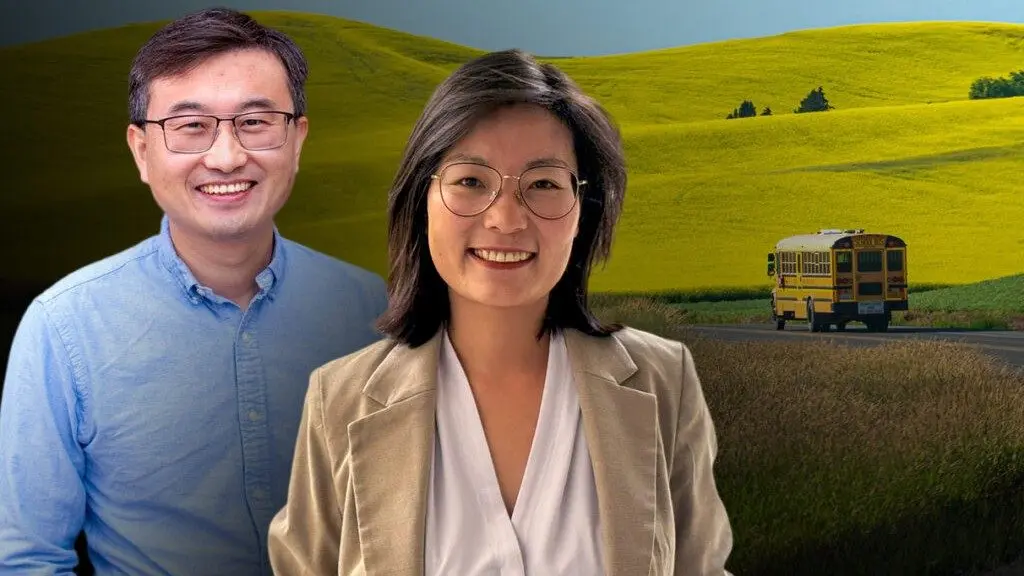PULLMAN, WA – A pair of Washington State University researchers have been awarded a grant from a global Microsoft initiative to develop an AI roadmap for rural schools, building on contributions from educators, researchers, and industry partners.
Tingting Li, an assistant professor in the College of Education, Sports and Human Sciences, was one of 17 senior fellows selected to the Microsoft AI Economic Institute, which supports efforts to ensure the benefits of AI are spread to all.
Li and fellow researcher Peng He, also an assistant professor in CESHS, will receive $82,500 to support their Rural AI for Societal Equity (RAISE) project, which will build upon their previous efforts to help teachers and students in small towns make the most of the rapidly expanding technology.
“We really want to see how our work can affect teachers’ teaching and students’ learning,” Li said. “From the systematic level, how can we achieve the goal of responsibly using AI for education? How can we better prepare teachers and students to become the responsible consumer of this new technology?”
The Microsoft AIEI cohort was drawn from nine countries across several disciplines, with a focus on how AI is reshaping education and opportunity.
Rural schools face particular challenges in adopting AI versus urban school districts. Teachers have less support and a smaller community of fellow educators to draw upon for help, putting their students at a disadvantage.
Rural schools face particular challenges in adopting AI. Whereas urban school districts have robust policies and resources for teachers to draw upon in using AI in the classroom and teaching students how to use it, teachers in rural districts have less support and a smaller community of fellow educators to draw upon for help, Li said.
That puts rural students at a disadvantage.
“We do see this as an issue of societal inequality,” she said.
Li and He will use the funding for a six-month project in K–12 classrooms in Eastern Washington, North Idaho, and Eastern Oregon. They have already begun forming relationships with school officials and educators in rural Washington schools through past projects, work that was supported in part by a previous award from Microsoft through its AI for Good program.
The researchers will now expand upon that foundation, conducting workshops, studies of interactions between teachers and AI, and interviews with administrators, educators and industry partners to find out what kind of help they need.
“Our approach is to always listen to their needs and their ideas first,” said Li. “Then go back to form our research work, then bring our research to them, and collect their feedback. So this will build a solid foundation for us to show that our AI work is grounded in the real classroom, based upon all these voices from the education system.”
Li and He will then develop the RAISE Roadmap, a collaboration framework connecting educators, researchers, and technology developers. The roadmap will provide evidence-based strategies for integrating AI into schools responsibly and sustainably.
Their work is among many projects across WSU to study AI and bring practical applications to Washingtonians in fields from medicine to agriculture to education. The Office of Research’s Advancing AI Research Working Group, led by Ananth Kalyanaraman, professor and interim director of the School of Electrical Engineering & Computer Science, is charting a path for the future of AI research at the university.
“At WSU, AI research is about impact, not isolation,” said Vice President for Research Kim Christen. “From classrooms to farms to clinics, WSU’s AI research is rooted in real-world impact This award reflects how we work hand-in-hand with communities to bring technology where it’s needed most — while advancing solutions in education, agriculture, and health for all.”
Li and He said they hope their work can become a model for AI in rural schools nationwide. Both researchers came to WSU last year and emphasized how grateful they were for the backing of their colleagues and others throughout the university.
“Our college is very supportive,” He said. “Our colleagues, our dean, our chair — all have been very supportive.”





